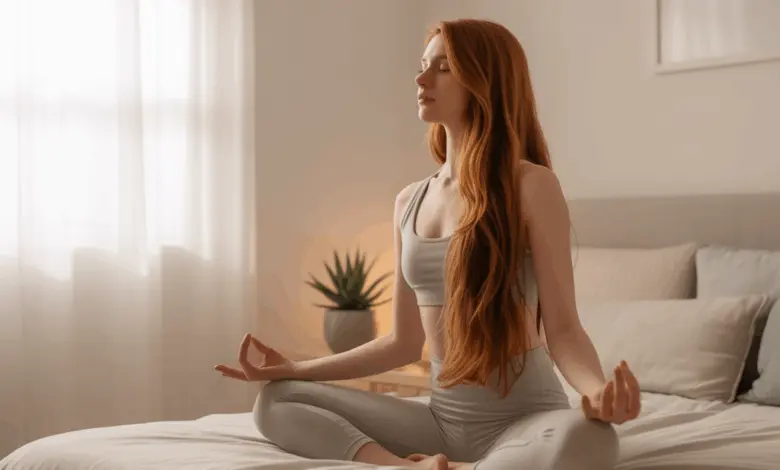How to Fall Asleep: Proven Tips, Workout Tricks & Lifestyle Advice

Have you ever stared at the ceiling for what feels like hours, wishing you could just drift off into a peaceful slumber? You’re not alone. Millions struggle with falling asleep every night, tossing and turning, while the clock ticks endlessly. Whether it’s stress, a busy mind, or simply a restless body, finding ways how to fall asleep faster and naturally is a game-changer for your health and daily energy.
Why Falling Asleep Quickly Matters
Falling asleep quickly doesn’t just save time; it improves sleep quality, reduces fatigue, and enhances your physical and mental wellbeing. Poor sleep can affect your workouts, mood, and even appetite, leading to a cycle that’s hard to break. Understanding the science behind sleep and adopting tried-and-tested strategies can transform your nights — and your days.
Start With Your Evening Routine: Create the Perfect Sleep Environment
Your bedtime routine and surroundings play a huge role in how fast you fall asleep. Simple tweaks can make your bedroom a haven for rest.
Dim the Lights and Limit Screen Time
Exposure to the blue light emitted by phones, tablets, and TVs suppresses melatonin — the hormone that regulates sleep. Aim to turn off screens at least an hour before bed, replacing them with a book or calming music instead.
Keep Your Bedroom Cool and Comfortable
The ideal room temperature for sleep hovers between 60-67°F (15-19°C). Too hot or too cold can interfere with your body’s ability to relax and fall asleep naturally.
Limit Noise and Distractions
Consider blackout curtains, white noise machines, or earplugs if you live in a noisy environment. This helps reduce disturbances that might wake you during the night.
Use Fitness and Movement to Your Advantage
Did you know regular physical activity can be your secret weapon for falling asleep faster? But timing and the type of exercise are key.
Best Workout Types for Better Sleep
- Cardio exercises like running, cycling, or swimming improve sleep quality but avoid vigorous cardio close to bedtime.
- Yoga and stretching are fantastic for relaxation and winding down after a hectic day.
- Strength training</strong helps regulate your body’s circadian rhythm, especially when performed earlier in the day.
When to Exercise for Optimal Sleep
Exercise boosts energy and alertness, so avoid vigorous workouts within two to three hours of bedtime. Instead, opt for lighter activities like gentle yoga or deep stretching to prepare your body for rest.
Healthy Lifestyle Habits to Support Faster Sleep
Beyond your bedtime routine and exercise, adopting overall healthy lifestyle habits can dramatically improve how quickly you fall asleep.
Watch Your Diet
Eating heavy meals late at night can disrupt your sleep. Instead, try small snacks like a banana or yogurt if you’re hungry before bed. Also, limit caffeine and alcohol intake, especially in the late afternoon and evening.
Manage Stress and Anxiety
Stress activates your nervous system, making it hard to fall asleep. Incorporate relaxing techniques such as meditation, deep breathing exercises, or journaling into your daily routine to calm your mind.
Stick to a Consistent Sleep Schedule
Going to bed and waking up at the same time every day trains your internal clock. Over time, this consistency reduces the time it takes to fall asleep and makes waking up easier.
Real-World Example: Sarah’s Journey to Sleep Success
Sarah, a busy marketing professional, used to struggle with falling asleep until she revamped her habits. She began by setting a strict no-screen rule an hour before bed, added a 20-minute evening yoga routine, and swapped late-night snacks for herbal tea. Within weeks, Sarah noticed she was falling asleep faster and waking up refreshed — ready to tackle her day.
How to Fall Asleep: Practical Tips Checklist
- Stop using electronic devices 1 hour before bedtime
- Create a calm, dark, and cool bedroom environment
- Exercise regularly, but complete workouts at least 3 hours before sleep
- Practice relaxation techniques like meditation or deep breathing
- Keep meals light and avoid caffeine in the late afternoon
- Maintain a consistent sleep and wake schedule
Frequently Asked Questions
On average, falling asleep takes about 10-20 minutes. If it takes longer regularly, it might be a sign of insomnia or poor sleep habits.
Yes! Regular, moderate exercise improves sleep quality and helps you fall asleep faster. Just avoid intense workouts close to bedtime.
Short naps (20-30 minutes) can refresh you without interfering with nighttime sleep. However, long or late-afternoon naps can make it harder to fall asleep later.
Conclusion: Take Charge of Your Sleep Today
Knowing how to fall asleep faster is about more than just lying still — it’s about creating a lifestyle that supports restful nights and energized days. Use the tips shared here — from crafting a soothing bedtime routine to optimizing fitness and nutrition — and watch your sleep transform. Ready to take your sleep and fitness journey to the next level? Explore our workout routines, dive into our nutrition guides, and get inspired with our latest wellness tips to boost your overall health.
Sweet dreams — and here’s to waking up refreshed and ready to conquer the day!
“`




